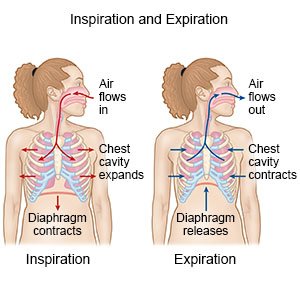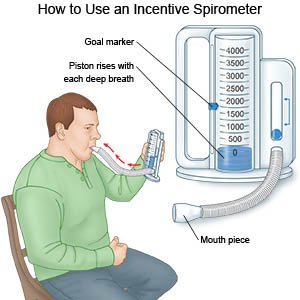Atelectasis
Medically reviewed by Drugs.com. Last updated on Apr 6, 2025.
Atelectasis is a condition that happens when the alveoli in your lungs cannot expand fully. This may cause part or all of your lung to collapse. Alveoli are tiny air sacs in your lungs that exchange gases and help put oxygen into your blood. The exchange of oxygen and carbon dioxide cannot take place in the alveoli when your lung collapses. Atelectasis may last for days. It may be caused by not being able to take a deep breath due to blocked airways or surgery. It may also be due to disease, infection, or trauma.
 |
DISCHARGE INSTRUCTIONS:
Call your local emergency number (911 in the US) or have someone call if:
- You have sudden trouble breathing.
- You have severe chest pain.
- Your lips or fingers look blue.
Seek care immediately if:
- The skin around your neck and ribs pulls in with each breath.
Call your doctor if:
- You are coughing up a large amount of mucus.
- You are more tired than usual.
- You have trouble catching your breath while you exercise or walk up stairs.
- You have a fever.
- You have questions or concerns about your condition or care.
Medicines:
You may need any of the following:
- Bronchodilators help open your airway to make breathing easier.
- Mucolytics help thin mucus so it is easier to cough out.
- Antibiotics help treat or prevent an infection caused by bacteria.
- Prescription pain medicine may be given. Ask your healthcare provider how to take this medicine safely. Some prescription pain medicines contain acetaminophen. Do not take other medicines that contain acetaminophen without talking to your healthcare provider. Too much acetaminophen may cause liver damage. Prescription pain medicine may cause constipation. Ask your healthcare provider how to prevent or treat constipation.
- Take your medicine as directed. Contact your healthcare provider if you think your medicine is not helping or if you have side effects. Tell your provider if you are allergic to any medicine. Keep a list of the medicines, vitamins, and herbs you take. Include the amounts, and when and why you take them. Bring the list or the pill bottles to follow-up visits. Carry your medicine list with you in case of an emergency.
Manage or prevent atelectasis:
- Change your position often. Sit on the side of the bed or walk after surgery as directed. This helps expand your lungs. Your healthcare provider may ask you to lie or sit in certain positions to help drain mucus. This is called postural drainage.
- Use chest percussion. Chest percussion is gentle clapping on your back or side to help move mucus out of your lungs. Chest percussion is sometimes used with postural drainage. Ask your provider for more information about postural drainage and chest percussion.
- Cough often. This can help clear mucus from your lungs.
- Do deep breathing exercises. This can help improve your lung function and decrease your risk for atelectasis. An incentive spirometer may be used to help you breathe deeply and slowly. Put the plastic piece in your mouth and take a slow, deep breath. Then let the air out and cough. Repeat these steps as directed. Ask your provider for more information on deep breathing exercises.

- Do not smoke. Nicotine and other chemicals in cigarettes and cigars can cause lung damage. Ask your healthcare provider for information if you currently smoke and need help to quit. E-cigarettes or smokeless tobacco still contain nicotine. Talk to your healthcare provider before you use these products.
- Drink liquids as directed. Liquids help loosen mucus. Ask how much liquid to drink each day and which liquids are best for you.
Follow up with your doctor as directed:
You may need more tests. Write down your questions so you remember to ask them during your visits.
© Copyright Merative 2025 Information is for End User's use only and may not be sold, redistributed or otherwise used for commercial purposes.
The above information is an educational aid only. It is not intended as medical advice for individual conditions or treatments. Talk to your doctor, nurse or pharmacist before following any medical regimen to see if it is safe and effective for you.
Learn more about Atelectasis
Treatment options
Care guides
Further information
Always consult your healthcare provider to ensure the information displayed on this page applies to your personal circumstances.
